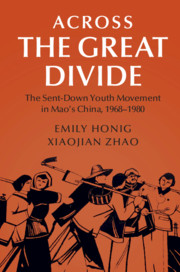Book contents
- Across the Great Divide
- Cambridge Studies in the History of the People’s Republic of China
- Across the Great Divide
- Copyright page
- Contents
- Illustrations
- Acknowledgments
- Stylistic Note
- Introduction
- 1 Farewell to the Huangpu River
- 2 Not All Quiet on the Rural Front
- 3 The Unplanned Economy
- 4 Inappropriate Intimacies
- 5 Urban Outposts in Rural China
- 6 Things Fall Apart
- 7 Epilogue
- Bibliography
- Glossary
- Index
4 - Inappropriate Intimacies
Published online by Cambridge University Press: 30 August 2019
- Across the Great Divide
- Cambridge Studies in the History of the People’s Republic of China
- Across the Great Divide
- Copyright page
- Contents
- Illustrations
- Acknowledgments
- Stylistic Note
- Introduction
- 1 Farewell to the Huangpu River
- 2 Not All Quiet on the Rural Front
- 3 The Unplanned Economy
- 4 Inappropriate Intimacies
- 5 Urban Outposts in Rural China
- 6 Things Fall Apart
- 7 Epilogue
- Bibliography
- Glossary
- Index
Summary
Chapter Four revisits the controversial issue of sexual assault of female sent-down youth. Archival records make it clear that the compilation of statistics and the investigation of sexual misconduct were part of a campaign triggered by a state directive in 1973 concerning “harm to sent-down youth,” a campaign that pressured local officials to identify, expose, and investigate locals who had romantic relations with female sent-down youth, and punish individuals found guilty of sexual assault. This was not limited to rape, but included a range of behaviors and relationships previously deemed inappropriate and now classified as criminal: seduction, adultery, and molestation as well as flirting, dating, and affairs. Regardless of what type of intimacy was the basis of accusation and investigation, in almost every case individuals found to be guilty perpetrators of abuse were local men, and those they abused were urban women. Male sent-down youth who engaged in similar intimacies with fellow sent-down youth or local women were exempted from the investigations, as were local men who engaged in such intimacies with rural women.
Keywords
- Type
- Chapter
- Information
- Across the Great DivideThe Sent-down Youth Movement in Mao's China, 1968–1980, pp. 87 - 116Publisher: Cambridge University PressPrint publication year: 2019



